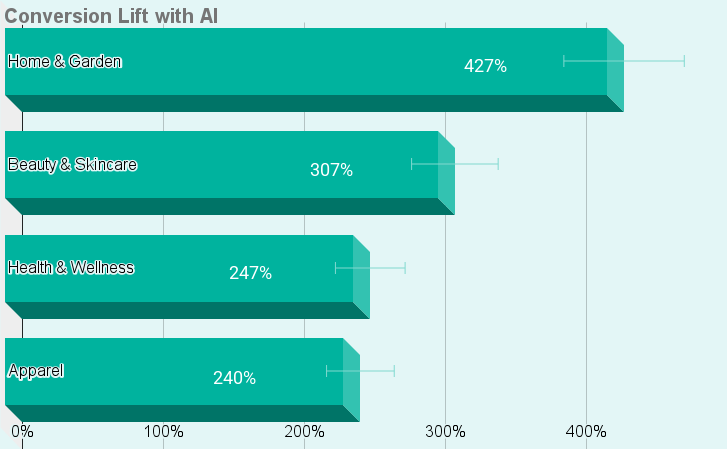Imagine walking into a store, and before you can even ask, a friendly assistant greets you, knows what you like, suggests exactly what you need, and answers your questions in seconds, without ever getting tired or pushy.
That’s what modern AI assistants for eCommerce are doing — but digitally, and at scale. And the proof? It’s not hypothetical anymore. With customer data from over 17 million online shoppers, Rep AI’s 2025 report shows how AI is reshaping the ecommerce world — not in the future, but right now.
They’re not just cute bots. They’re full-blown sales reps, support agents, AI-powered shopping assistants, and even product analysts — quietly working 24/7 behind every high-performing ecommerce store.
Let’s break down how these smart helpers are transforming online shopping experiences, boosting customer satisfaction, and helping eCommerce businesses compete smarter.
The Rise of AI Assistants in eCommerce
You’ve probably noticed the shift already — fewer “Contact Us” buttons, more “How can I help?” chat bubbles. Today’s AI shopping assistants are a far cry from the clunky support bots of the 2010s.
According to Rep AI, nearly 45% of online shoppers now engage with these assistants when prompted, and an astounding 93% of their customer queries are resolved instantly. That’s not just convenience — that’s competitive edge.
Shoppers today want instant support, human-like conversations, and personalized guidance — without digging through FAQ pages. And thanks to advances in natural language processing capabilities and machine learning, virtual assistants are now smart enough to deliver real value, not just scripted replies.
Virtual shopping assistants today can:
- Chat in real time, 24/7
- Recommend products based on past behavior
- Help shoppers navigate the product catalog more efficiently
- Answer questions and offer personalized recommendations
- Analyze reviews, trends, and customer interactions
No wonder eCommerce giants (and savvy mid-sized players) are investing heavily. And it’s not just for show — it’s driving sales, saving on support costs, and building brand loyalty.
How AI Assistants Boost eCommerce Conversions
Let’s get to the money part: these assistants don’t just answer questions — they help people buy.
A great AI shopping assistant behaves like a smart, friendly associate. It knows what someone viewed, abandoned, added to cart, or favorited. It knows when to offer a discount, when to recommend bundles, and when to step back.
Some of what these ecommerce shopping assistants do:
- It learns your customer data — what someone viewed, added to cart, or clicked on
- It gives tailored recommendations right when the shopper needs a nudge
- It answers customer queries instantly (which often stops cart abandonment)
- It can upsell or cross-sell without sounding like a robot
These tailored recommendations and proactive conversations boost customer engagement and lead to improved customer satisfaction, keeping shoppers active.
According to Rep AI, returning customers who chat with AI spend 25% more on average, increasing average order values — proving that smart, conversational guidance isn’t just helpful, it’s profitable. AI-driven strategies like these have resulted in increased sales for many businesses.
And since AI shopping assistants don’t sleep, they catch those 11 PM browsers — or Saturday morning impulse buyers, when human agents can’t. They also help convert potential customers who might otherwise leave without purchasing. 12.3% of shoppers who chat with AI convert, compared to just 3.1% without AI interaction. That’s 4X the conversion rate, purely through proactive, personalized conversations.
Also, the effect is massive in certain categories:
| Category | Conversion Lift with AI |
| Home & Garden | +427% |
| Beauty & Skincare | +307% |
| Health & Wellness | +247% |
| Apparel | +240% |

In short? They remove friction, help with product discovery, and guide people toward the “Buy Now” button, boosting conversion rates across the board.
Automating Customer Support With AI for Client Satisfaction
Let’s be real: Most support queries are boring. “Where’s my order?” “How do I return this?” “Does it come in blue?”
They’re important, but answering them manually eats time, money, and team morale. Virtual shopping assistants now support customers in real time, providing immediate help and improving customer satisfaction.
This is where AI assistants shine, powered by advanced AI powered solutions that automate responses and streamline support.
They handle:
- Order status questions
- Shipping/return policies
- Size and availability checks
- Product FAQ
- Understand customer engagement and queries using advanced technology to interpret and respond accurately
And they do it instantly, through chat, email, and even voice interfaces.And they do it across all touchpoints — chat, email, and voice — using natural language processing to understand customer queries instantly.
Rep AI shows these assistants can resolve 93% of requests without human help — freeing your team for high-value work and leaving customers delighted by the speed of support.
- Fewer support tickets for your team
- Faster answers for your customers, often in just a few clicks
- Happier shoppers (and better reviews)
Even better, modern virtual shopping assistants can escalate to human agents if needed, ensuring no one gets stuck in a loop.
The cost savings are real, but so is the improved customer experience. And in eCommerce, that’s everything.
Personalizing Customer Journeys With AI
You know how Netflix seems to know what you want to watch next? That’s personalization powered by AI — and it’s just as powerful in eCommerce, delivering personalized shopping experiences that make every interaction more relevant and engaging.
Smart shopping assistants use customer behavior, past purchases, and session data to personalize:
- Product suggestions
- Homepage content
- Email follow-ups
- Search results
The assistant’s ability to provide relevant suggestions is key to making each customer feel understood and valued.
Let’s say Emma buys protein bars and yoga gear. Next visit, she is shown new wellness products and offered a discount on a matching mat. That’s not a coincidence — it’s smart AI-powered logic working in the background.
Data driven insights from customer interactions help optimize personalization by identifying trends, refining question flows, and adapting to changing preferences.
This type of personalized shopping experience fosters trust, streamlines purchasing decisions, and enhances customer retention.
In fact, McKinsey reports that personalization can increase revenue by 10–15% and dramatically enhance customer engagement.
What’s Behind the Scenes: Natural Language Processing and the Tech That Powers These Assistants
None of this works without the right tech stack.
Today’s AI assistants for eCommerce are powered by:
- AI Technologies — The foundational layer enabling advanced automation and intelligence
- Natural Language Processing (NLP) — Understands text and speech like a human would
- Machine Learning — Learns from every interaction to improve over time
- Conversational AI — Keeps chats human-like and context-aware
- Generative AI — Uses large language models to create SEO-friendly product descriptions, maintain brand voice, or generate answers from scratch
Platforms like Shopify, Magento, and even Amazon now support plug-and-play AI tools, including virtual assistants, making this tech accessible beyond tech giants.
Some of the top marketing tools and platforms include:
- Zoovu (guided selling)
- Salesforce Einstein
- Bloomreach AI
- AWS Generative AI tools for eCommerce
- AI chatbots that provide 24/7 customer support and personalized shopping experiences
They connect with your inventory systems and product catalog, pull in customer data, enhance your product pages and generate intelligent interactions — all without manual input. Integrating these tools into your e commerce website can improve customer support, increase revenue, streamline operations and fasten shopping online experiences. For a closer look at how businesses are applying these technologies, check out this real-world guide on AI for eCommerce.
AI is also transforming how customers interact with product pages, shifting from static browsing to dynamic, conversational experiences that better understand and serve shopper needs.
Challenges And What to Watch Out For
AI isn’t magic — and it’s not always plug-and-play. Even the smartest AI-powered solution can miss the mark without strategy.
Here are the common pitfalls:
- Over-automation: Don’t let the assistant become a gatekeeper. Always offer an easy way to reach a human.
- Poor training: AI is only as good as its data. If your catalog is messy or outdated, it will reflect that.
- Data privacy: Be transparent about how customer data is used, and ensure compliance (GDPR, CCPA, etc.)
Pro tip: Start small. Let your AI assistant own one stage of the customer journey — like answering questions post-sale or assisting in product discovery — and scale from there.
What’s Next: Future Trends in AI Assistants for eCommerce
We’re just getting started.
eCommerce brands will leverage these trends to stay ahead in a rapidly evolving market.
Here’s where things are heading in 2025 and beyond:
- Voice commerce: “Alexa, reorder my favorite moisturizer.”
- Multimodal AI: Shopping with images + voice + chat, all at once.
- AR/VR + AI: Try-on assistants that recommend size, fit, and style based on photos or scanned avatars.
- Predictive analytics: Knowing what customers want before they even type it.
Conversational commerce will become more prevalent, with AI-driven chatbots and virtual assistants providing real-time, personalized assistance and product recommendations throughout the shopping journey.
Expect eCommerce AI agents to work across marketing channels, not just on-site. Think email campaigns, push notifications, or product drops — all personalized, all automated.
Soon, your AI shopping assistant will be part of your creative team, too — drafting copy, planning offers, and pricing optimization, and channel targeting — all based on real-time data-driven insights. eCommerce AI will continue to drive innovation, automation, and smarter decision-making for online retailers.
Conclusion: Time to Hire Your First AI Assistant
You wouldn’t open a retail store without staff. So why run your eCommerce website without a virtual shopping assistant — the digital equivalent of a helpful in-store team member?
Whether you’re selling home goods, beauty, electronics, or fashion, the right AI powered solutions can help you:
- Sell more (with better conversion rates)
- Support better (fewer tickets, happier customers)
- Spend less (automated, not overloaded)
And the best part? These tools aren’t reserved for Amazon or Nike anymore. They’re available — and affordable — for eCommerce businesses of all sizes.
Start with one smart AI assistant. Train it well. Give it clear goals. Then let it go to work — so your team can focus on the things AI can’t do (yet).
Ready to enhance your online store? Explore eCommerce shopping assistants to transform your business today.











